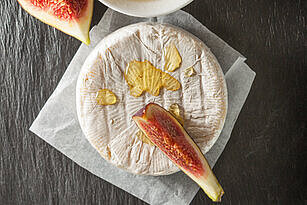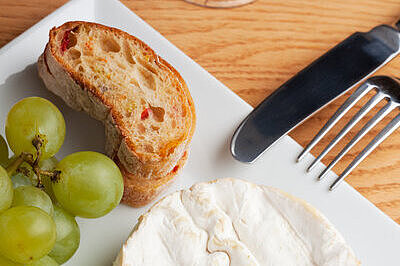Munster cheese

What is muenster?
Muenster is a cheese made from cow's milk that is treated with red smear bacteria. These give it its typical red or orange rind and its intense smell. The cheese matures for at least three weeks and has a fat content of 45 percent in the dry matter. It is usually sold in round loaves of around 200 grams.
What are the benefits of Muenster for dogs?
Muenster can have several benefits for dogs if it is fed in moderation. Firstly, it is a good source of calcium, which is important for bones and teeth. Secondly, it also contains other nutrients such as protein, vitamin A and B vitamins, which support the immune system and metabolism. Muenster can also be used as a treat or reward, as many dogs like its taste.
What are the disadvantages of muenster for dogs?
Muenster also has some disadvantages for dogs that you should be aware of. Firstly, it is very high in fat and can therefore lead to obesity or digestive problems if it is fed too often or too much. Secondly, it can also trigger allergies or intolerances, especially in dogs with lactose intolerance or sensitive stomachs. In addition, the strong smell of muenster can attract other dogs or make them aggressive if your dog eats it.
How much muenster can my dog eat?
There is no general rule on how much muenster you can feed your dog. It depends on various factors, such as your dog's weight, age, activity level and health. As a rule of thumb, however, you should not feed your dog more than 10 grams of muenster per kilogram of body weight per day. This means, for example, that a dog weighing 10 kilograms should not eat more than 100 grams of muenster per day.
Muenster is a tasty cheese that can have some advantages for dogs, but also some disadvantages. You should therefore only feed it in small quantities and occasionally as a treat or reward. Also pay attention to how your dog reacts to the cheese and whether he tolerates it well.
Properties 5
Are you looking for other ingredients with a specific property?
Just click on them to find more.
If you notice any signs of hypersensitivity or poisoning in your dog, you should see your vet immediately. We are not a substitute for a vet, but we try to be as accurate as possible. Every dog reacts differently and we recommend you get a second opinion or consult your vet if in doubt.
Stay healthy and take good care of your four-legged friend!😊
Similar to Munster cheese
Limburger is a semi-soft semi-hard cheese made from cow's milk. It has a reddish-brown rind that is treated with special bacteria. These bacteria are also responsible for the typical smell of...
Taleggio is a soft cheese made from pasteurized or raw cow's milk, which is stored in moist and cool ripening chambers for at least 40 days. It is regularly washed with salt water to promote the...
Brie is a soft cheese from the blue cheese family. It is made from pasteurized or raw cow's milk and mixed with lactic acid bacteria and mould. The mold rind forms during the ripening process and...
Camembert contains a number of nutrients that are important for dogs. These include Protein: Camembert is a good source of protein for dogs, helping to build and maintain muscles, skin, coat and...



